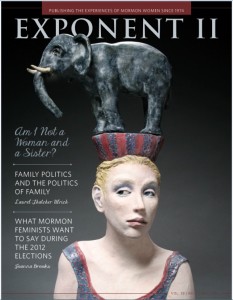After our Exponent II Gets Political Blog series, we are pleased to announce the online publication of our Fall 2012 issue (scroll to the bottom of the page). Hard copies will be in the mail this Saturday morning.
We are so excited about this issue with insightful pieces from Mormon academics, politicians, and women discussing frankly their choices for the next United States president. And, there’s the suffrage song written by Woman’s Exponent founding https://exponentii.org/wp-content/uploads/2021/12/IMG_5173-scaled-2.jpg Louisa Greene Richards, “Woman Arise.” There are a few (very few) copies still available, so get your subscription now before we’re sold out.
Letter from the Editor
“Hey, Red Aimee! Have a great summer. Stay cute and cool.” This sentiment, or something closely resembling it, fills the pages of my eighth-grade yearbook. At the time, I tried to think of it as a term of endearment, hoping that it meant I was at least interesting enough to have been given a nickname. But the truth was, as an inactive Mormon girl growing up in Provo,Utah, in the 1980s, the last thing I needed was to also be considered a Communist!
Growing up, I had always been vocal about various social causes. At age eight, I joined Greenpeace and circulated a petition through my elementary school to “help save the whales.” In the sixth grade, I chose to research the Soviet Union for our school’s World’s Fair. As a child of the Cold War who’d spent sleepless nights wondering when the “star wars” would begin, I wanted to learn about the children of the U.S.S.R. and whether or not they shared my fears. At age 12, I was too young to be interested in Communism-! was interested in world peace-but my teacher was uncomfortable with me researching this “godless nation.” In this politically conservative environment, my burgeoning progressive viewpoints were often seen as radical at worst and marginal at best to many of my peers and teachers. Staged debates in middle and high school on topics including women serving in the military, capital punishment, climate change, and the welfare system often left me standing on my own. The fact that my progressive positions could be labeled “Communist” by my peers speaks to how unacceptable and threatening even a baby Democrat could be to
some in this bastion of conservatism.
All of these dynamics were complicated by my outsider status as it related to the Church. While I had developed my political point of view in Provo, I had done so apart from the LDS Church itself. Because all of my peers and teachers, as far as I knew, were active Mormons who also appeared right-leaning in their politics, I became convinced that the Church’s teachings must appeal exclusively to conservative Republicans. I resolved that I could never participate in such a religion.
And yet, for the past 18 years,I have been a practicing member of the Mormon Church. While in college at the University of Utah,I began to engage with LDS history and theology and in that study discovered that the political values I had seen in Provo were only one possible expression of this religion’s rich and complex teachings. Where one LDS practitioner can read Mormon scripture as a call to personal agency and responsibility,another can read it as a call to social justice where individual salvation is dependent on the collective spiritual and temporal equality of society.
I have found a spiritual home and community in Mormonism that has not forced me to compromise my political point of view. I wish I had heard more of that political diversity while growing up in Provo. As it turns out, many of those good Mormon peers and teachers that my eighth-grade mind had assumed were unflinching conservatives don’t happen to be as conservative or intransigent as I’d once supposed. As a religious community, I wish we would do more to celebrate the diversity our
rich theology and history can produce in its members, rather than finding strength in empty displays of conformity.
In this historic political moment, Exponent II is focused on putting to rest the notion that Latter-day Saints are one monolithic, Christian Conservative voting bloc. A recent Pew Research poll shows that around 17% of American Mormons consider themselves Democrats. As a feminist magazine, we know that our writers and readership tend to lean more progressive,yet the rich diversity of political thought within Mormonism can also be seen on the following pages. From a call to bipartisanship from former Republican Utah House Representative Sheryl Allen, to Marina Capella’s sacrament meeting talk on progressive environmental stewardship, to Laurel Thatcher
Ulrich’s historical perspective on Mormon politics, we can experience a small and diverse sampling of Latter-day Saint women’s political perspectives.
Though it’s sometimes tempting to create an identity for ourselves and others around a label, we know that real people are more complex, interesting and wonderful than a single word can encompass. For evidence of this fact, we invite you to keep reading …
Aimee Evans Hickman
Exponent II Co-Editor-in-Chief



